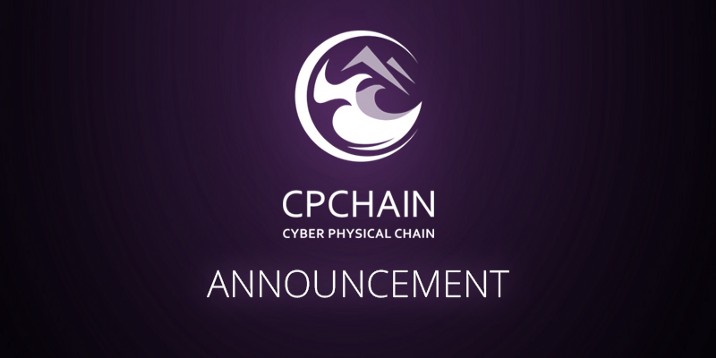CPChain Announcement about R&D and the Mainnet
by CPChain at Oct. 17, 2018

Dear CPChain Community,
This is an important post about our roadmap and the exciting future of CPChain. We will discuss the current state of our project, and our commitment to the development of a truly innovative technology.
The CPChain team believes in developing a decentralized and secure future that empowers the individual in ways they never knew were possible. Blockchain technology has exhibited considerable capacity in solving data security and privacy issues in the form of a decentralized database, but currently suffers from scalability problems. CPChain will revolutionize the application of blockchain’s core underlying technology in the Internet of Things, and provide the infrastructure for the sharing and transaction of IoT data. On CPChain, we can build data aggregation and real-time data flow applications to maximize the value of IoT data, and build a new generation of IoT.
The rapid development of Internet of Things technology has led to the sharp increase in the number of interconnected devices. An immense amount of data is generated by these large-scale IoT devices. CPChain has developed PDash (Parallel Distributed Architecture for Data Storage and Sharing) to be a scalable blockchain-based platform for IoT data storage and sharing, that makes it possible for users to keep ownership of their own data as well as share data securely with economic feedback.
At the beginning of the year we released our whitepaper sharing our mission with the community.
“CPChain aims to construct a basic data platform for the IoT system, providing a full process solution for data acquisition, storage, sharing and application.”
In order to achieve our goals, the CPChain team has been working diligently to develop our technology in a timely manner.
As stated in our last Community Update, R&D is the soul of a good project and CPChain is lucky to have capable engineers dedicating themselves to developing our IoT-Blockchain Platform. Since we published the roadmap, we have expanded our team and open sourced part of the PDash platform, released RNode eco-system framework in our DPoR (Dynamic Proof of Reputation) consensus protocol, and completed the development of the OTP (Open Transmission Protocol).
From an ecosystem development prospective, CPChain has joined some international organizations such as TIOTA (Trusted IOT Alliance), MOBI (Mobility Open Blockchain Initiative), and IEEE-SA (Institute of Electrical and Electronics Engineers). In addition, we have reached partnerships with LTO Network, Nuggets, Hunan Zhichao Information Technology Co., Ltd, and The National Vehicle Driving Safety Engineering Technology Research Center. More partnerships and ongoing POCs will be announced in the future.
We have also made a concerted effort to publish content that can educate the community on the potential of our platform through a combination of animated videos and detailed articles discussing specific use cases; for example, smart city development, smart healthcare solutions, and blockchain applications for the automotive industry.
Updating our roadmap:
When creating our roadmap at the beginning of the year, we made our best projection of certain events based on estimated development time and potential challenges we may encounter along the way. Blockchain is a relatively new technology, and developing truly innovative technology in this field requires serious research, time, and dedication. As the blockchain gains recognition as a transformative technology, innovative companies and talented individuals dedicate more time to research and development in the field every day, providing a constant evolution of understanding in the field of blockchain technology.
CPChain has encountered this evolution firsthand. CPChain’s R&D is divided into three major categories: mainnet development, PDash development, and consensus algorithm design. In addition to achieving promising results in the development of PDash and the consensus algorithm design, the mainnet has been continuously developed for peak performance. However, during the development of the mainnet, the CPChain team discovered additional fields of technological innovation which would greatly improve our networks long-term infrastructure and increase the number of potential use cases for CPChain.
This proposed a dilemma for us: launch our mainnet with limited functionality for the time being in order to meet our estimated launch date, or delay the mainnet release to ensure that we are launching a fully optimized platform ready to support all of our partners, use cases, and transactions from day one. After many internal discussions, the decision was clear. We have decided to focus on maximizing the potential of CPChain through the development and implementation of additional functionality. Therefore, we are announcing to the community:
CPChain decides to adjust the official release date of the Alpha version of the mainnet to the end of December 2018. At the end of March 2019, mainnet will be officially launched.
There are a few important questions that we would like to answer for you.
- When will we get more details on node rewards?
Soon. We will be releasing a post on this in the near future, nodes hold more than 20,000 CPC will be eligible to receiving rewards through a specific designed testing phase before the Alpha version of the mainnet. - When is the mainnet launch?
The mainnet launch will happen in two phases, the Alpha version of the mainnet will be released on December 2018. At the end of March 2019, mainnet will be launched. - Will you release an updated roadmap?
Yes. We will be releasing an updated roadmap for the public, but it is important to remember that a roadmap is not a schedule, it is only an estimated date of completion.
From a technical perspective, we would like to discuss 5 fields of consideration for our short-term development priorities.
1. The introduction of the Private Transaction/Data Privacy mechanism. In order to ensure the security of user transaction information, we have added the Private Transaction mechanism. The Private Transaction is a set of proprietary trading mechanisms implemented on the CPChain blockchain. The Private Transaction enables the two parties to complete a transaction under the witness of an intermediary, ensuring that the transaction is not detected by the outside world, but will still be recorded on the blockchain for future traceability and verification. The relevant information and transaction data of the transaction are secretly encrypted by a special encryption, and the transaction process between the buyer and the seller is protected through the intermediate privacy contract. The Private Transaction, combined with the InterPlanetary File System (IPFS), will ease the storage pressure on the blockchain during mass private transactions and make large scale private transactions possible.
2. Additional innovation in the field of Admission Control in CPChain consensus system. The Admission Control is designed to ensure the safety and sustainability of the RVAP (Reputation Value Assessment Procedure). For members of the RNode committee, Admission Control will set up hardware standards to automatically detect and filter members who do not meet the requirements of DPoR to ensure that the CPChain network can operate healthily and efficiently. In the following development process, we will make more in-depth improvements to the following points:
CPU & Memory Auto Detection:
Through a CPU-bound and I/O-bound algorithm, it will be designed to get a nonce of the algorithm within a certain time. By verifying the user’s signature time, it can be decided whether to add the user to the committee candidate list.
CPU Auto Assessment:
This design uses a CPU-intensive algorithm to assigns tasks for RNode candidates to calculate the solution to a specific problem in an appropriate time frame, with a signature attached. With verification of the signature, solution, and the time; it can be determined whether the requirements for joining the committee are met.
I/O:
This design uses I/O-bound algorithm to test the memory capacity of committee candidate.
Storage:
This design uses a storage-intensive algorithm to test the storage capacity of the RNode candidate.
Input:
Signature, dynamic bytes, a certain time
Contract Verification:
Verify nonce/time/signature by EVM Opcode
3. Additional improvements to the design of the Committee Node to add and verify blocks more efficiently. In the past few months, we have designed the running logic of the committee:
· A Node becomes an RNode through Reputation Assessment and regular elections, and has the opportunity to become a committee node.
· When an RNode has become a member of the future committee, the node will encrypt its own Node ID with the RSA public key of other future committee members and update the corresponding smart contract.
· When all committee members know each other’s Node ID, they will establish a special network of committees and keep communicating until they formally become committees.
· After the formal committee is formed, the committee nodes shall fulfill their obligations: to issue blocks in turn and to verify the received blocks with signatures. When more than 2/3 members’ signatures are collected, the block will be considered legal and broadcast to the entire network.
· After all members have added the block, the committee task is completed. The committee’s network will be disconnected and the right to add blocks will be transferred to the next committee that has established the connection.
The continuous improvement of the committee’s network can effectively improve the communication efficiency between committee members and thus enhance the TPS of the network. Credibility-based elections can continually dynamically replace committee members and avoid committee centralization issues.
4. Regarding the facilities, we will update the CPChain API to increase the system functionality. We want to create gRPC with remote procedure to provide an interface for internal and external communication. The design of the API has the characteristics of low latency, high load, independence, bandwidth saving and reduced TCP link times. gRPC is a high-performance, general-purpose open source RPC framework that supports the HTTP 2.0 protocol and serializes data streams with protoBuf 3.0. Through streamlined, comprehensive and Independent API design, users can achieve full interaction with CPChain as well as customizing their services with the API.
5. CPCG is an extremely important development for CPChain. Taking into consideration community interests and future ecological development, we finally decided on building a two-token system to empower the CPChain Ecosystem.
In this mechanism, the CPC coin will function as a value certificate, symbolizing node rights in the network, and will be used to support the normal operation of the network, and to incentivize nodes to collaboratively manage the blockchain.
CPCG is a Gas Token that supports the basic execution of blockchain networks, such as transaction fees between nodes and the execution costs of smart contracts.
The two-token system determines the Generation Velocity of the CPCG based on factors such as the Business Frequency, Value Flow Velocity, and Complexity of Smart Contract. Using those factors, the system determines the Reward Distribution of CPCG per the activity level of the nodes and the Ecosystem Contribution.
The ultimate goal of the two-token system is to improve the stability of the system while actively mobilizing the community by encouraging nodes to fully participate in the ecological construction of CPChain.
We know our community and partners have confidence in the R&D capabilities of our team, and we want you to know that your patience and support will be rewarded. Our goal has always been to develop a platform that will facilitate meaningful adoption of blockchain technology, and we are striving for perfection. The delay in the mainnet launch is not a concern, adding additional functionality will only improve the quality and scope of our project.
At the end of October, we will open source part of the DPoR consensus protocol and additional development for PDash. In order to give back to our community, CPChain will launch the Economy Node Test Phase in the near future. Details about the Economy Node Test Phase will come in the following weeks. There will also be an additional post explaining CPCG in greater detail. Updates on the project development process and related market cooperation news will be released frequently over the next few months, so stay tuned!




